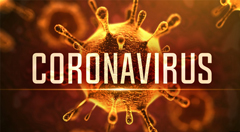 We certainly aren’t the medical experts that you need to pay attention to, in regard to the Coronavirus. That would be your doctor, the local health department and information from the CDC.
We certainly aren’t the medical experts that you need to pay attention to, in regard to the Coronavirus. That would be your doctor, the local health department and information from the CDC.
But we do have some thoughts and suggestions on how to behave with donors during this health crisis. Here’s our list:
- First, follow all the advice we all are getting about being vigilant about the state of your own health and going to your doctor if you have any of the symptoms, and be sure you’re aggressively keeping your person sanitized, etc. all the time – that whole washing-your-hands thing. As I write this, Jeff is at my home here in Asheville and we’re both incessantly washing our hands and being careful when we cough. You know the routine.
- Be particularly sensitive about personally visiting with donors. There are two sides to this. One is the donor’s side – they may not want to have personal contact with you at this time, so be aware of that. I know you want to meet with them and you have business to do. But now is not the time to press that agenda. On your side, out of heightened caution, you may not want to have contact either. Talk to your manager about this, and be wise and careful about it.
- If you’re making personal contact be cautious about shaking hands, coughs, sneezes, etc. You have heard all about this, so just follow what you’ve been told. But if you and the donor are meeting because you both think it’s ok to do so, then meet and say, upon seeing the donor: “Good to see you, NAME, I’m not going to shake your hand – just trying to be cautious these days.” Something to that effect that shows respect for them.
- If you’ve decided not to visit, then up your communication via phone, email, text and snail mail, telling the donor why you’re doing it (which is out of caution, etc.). This tells the donor you’re concerned about them and yourself, and that you’re putting them above the money you can secure from them. One thing you could do is send a personal note, hand-written and hand-addressed, to each of your caseload donors that tells them you’re thinking of them during this time and explaining what you’re doing and why. You’ll have time to do this if you’re not out visiting donors.
- While you’re doing all of this, explain to the donor that the needs your organization is addressing aren’t going away and that, in fact, with this coronavirus event, those needs are in jeopardy of not getting funded because of distractions, health concerns, etc. And that now it’s even more important to have their support. This is a very important point. Jeff and I think that if you don’t make this point, you’ll run some risk of donors getting distracted and not giving as they normally do.
There you have it. Our five steps to take during this time. If you have other input or ideas, please send them to us. Remember, this will eventually pass. But right now you have to keep moving ahead as best you can, and continuing to match the passions and interests of your donors to the needs your organization is addressing.
Richard







We were just finalizing our spring appeal yesterday when CV-19 precautions really ramped up. We were reconsidering the appeal due to timing and stock market slump; didn’t want to mention CV-19 without sounding opportunistic… Thank you for #5 on this – it will help us reframe our appeal! I enjoy your emails and blog posts so much. Looking forward to the mid-level certification course next week.
With many offices being remote (including mine) we are no longer doing snail mail and have halted many of our solicitations. It’s causing us to think and plan about how we run our annual giving program. Do you have any suggestions about running this program with out using solicitations? – thank you!
Whoa! Hang on Dana. Do not get rid of snail mail or halt your solicitations. That is not a solution. In fact, if you implement that you will go backwards. Remember, your organization has an important and needed mission. Focus on that and the needs that are being met through you. And boldly ask your donors to support it. Now is not the time to do anything other than that. On the annual giving program – get rid of it and transition to connecting your donor to your cause. We have written a lot about that.